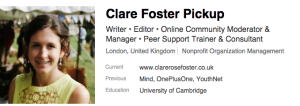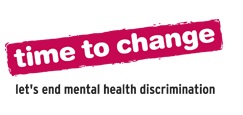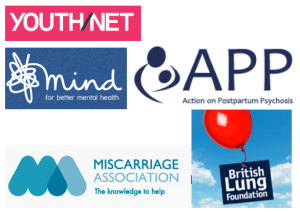Pressing pause

Every time I go to press ‘publish’ on a tricky post exploring my mental health I pause for a moment. The way my blog has developed means that my personal struggles and successes sit alongside blogs about my work and details of my skills, training and experience.
Should I keep them separate? Will employers reject me if they read that I took Citalopram for 15 years or that I use exercise to manage my anxiety?
I know stigma and discrimination around mental health in the workplace exists. I spent 2014  providing evidence based reports on mental health policies and support in a number of organisations across a range of sectors for the Time To Change Organisational Healthcheck programme. Tom Oxley writes a good piece about how the programme worked on pages 10 and 11 of this newsletter.
providing evidence based reports on mental health policies and support in a number of organisations across a range of sectors for the Time To Change Organisational Healthcheck programme. Tom Oxley writes a good piece about how the programme worked on pages 10 and 11 of this newsletter.
I spoke to people in every workplace who said that they wouldn’t tell their manager if they were experiencing a mental health problem. Many said they would lie about taking time off.
”I’d probably say I had a migraine or something”
Those who had been honest about taking time off for a mental health problem said they felt that now they had more to prove.
Unfortunately in some cases I could understand why. Some managers said they felt people with mental health problems couldn’t ‘cope’. Others saw investment in employees’ mental and physical health as a burden rather than something that makes moral and business sense.
”You’ve got to be careful or people will just take advantage, start using ‘depression’ as an excuse.”
”We need people on top form to do this job – if you’re depressed you just won’t be able to cope.”
1 in 6 employees are currently dealing with a mental health problem. Like colds, flu, delayed trains, bereavement and accidents it’s always going to be part of a workforce. It’s how employers deal with it that counts.
My mental health is part of what makes me. It’s part of what makes a life – and in many cases it’s part of what makes me good at the work I do.
Pressing publish – every time
In the run up to Time To Change’s Time To Talk Day on Thursday I thought I’d share some of the reasons why I press publish on those tricky posts every time.
- If mental health in the workplace isn’t talked about, it becomes harder to manage.
Employees feel unable to mention difficulties at a time when steps could be taken to help resolve them. They don’t realise colleagues might be going through something similar. They don’t have anyone they can talk to about what might help. They certainly won’t have workplace initiatives to give them suggestions, advice or support.
Imagine if someone felt they had to hide their broken leg or back problem from their employer. They’d be sitting at the bottom of the stairs grimacing in pain but unable to get to their desk or explain why they need a lift. If they do struggle to their computer they may be unable to concentrate as their chair is ill designed and it’s making their pain worse. Their condition might deteriorate as they try to hide it. They become unreliable. They might end up having to have an operation that means they are off sick much longer term. The employer – who knows no better – may think it was a problem with their approach or ability. In fact an open conversation and a few practical changes would mean they were able to work to full capacity again.
The more it’s talked about, the more employers will start to acknowledge that all their staff have mental health. The more they’ll understand that at any given moment some will have mental health problems too.
Then they can seek information and training. They can help employees talk openly about their needs. Appropriate support can be put in place early (Wellness Action Plans or WAPs are good) and in most cases people continue to work effectively.
- I don’t think that telling people I manage a mental health problem is admitting a weakness.
It’s sharing strengths I’ve learned. Managing my depression, anxiety and eating issues has improved my emotional intelligence, my empathy and my resilience. Withdrawing from my anti-depressants required determination. I know what I need to function effectively and how best to achieve it. I know my abilities and have the self awareness to recognise the edge of my strength before I reach it.
- Working helps me. It makes me stronger and boosts my self-esteem.
Everyone does better when they enjoy what they are doing. I love my work. I want to remind employers that people who manage a mental health problem can also be resilient, capable and the right person for the job.
We’re all human and we all have physical and mental frailties that mean sometimes we can’t work to full capacity. Anyone who thinks otherwise is kidding themselves. In the long term I do a lot better if I’m open about what helps me do the best I can – and why.
Not everyone is so lucky – I talk openly for them
 I know that I’ve been lucky with the employers, colleagues and freelance projects I’ve had. I work in a world where it’s generally easier to talk openly about mental health. And of course doing so is absolutely a personal choice (Time To Change has some advice on disclosing mental health problems to employers).
I know that I’ve been lucky with the employers, colleagues and freelance projects I’ve had. I work in a world where it’s generally easier to talk openly about mental health. And of course doing so is absolutely a personal choice (Time To Change has some advice on disclosing mental health problems to employers).
I don’t know what employers will think in the future. Maybe I will lose work occasionally. But I’ve seen the impact on workplaces where organisations don’t take the mental and physical health of their employees seriously. It’s often pretty desperate and miserable.
I share my experiences to help myself, to help others and to reduce the stigma surrounding mental health. It doesn’t make sense to me to do that partially.
Managing a mental health problem involves determination, bravery, strength and self-awareness. I think I’m happy adding that to my CV.

I have a senior management role in an organisation and have only recently been open with my employers about longstanding depression. Much of what you write is my experience too – my manager is not outwardly discriminatory but I experience judgements, assumptions and a clear sense of being more closely observed. The situation is unlikely to get better without people being open about mental health but it’s hard to be open. New to your blogs, it’s great to have a sense of shared experience.
Thanks for your comment Louise. I agree it isn’t simple – I was a bit worried this post might come across as suggesting everyone should *obviously* be open when in fact it is much more complex and dependent on so many different factors. Mind and Time to Change do have lots of good resources to help both employers and employees 🙂
Great blog. I have had the rotten experience of talking about having depression in a job interview, only to have the interviewer start asking loads of questions about my “resilience” and “how well I cope under pressure”. I wish I’d been able to explain at the time that depression isn’t anything to do with strength or weakness – it’s an illness. Either you’re lucky or unlucky, really. How we manage to cope with an illness isn’t really any of the employers business unless they want to get on board and help make adjustments – which they absolutely should!
Absolutely – if you mentioned a ongoing ‘physical’ illness it would be incredibly inappropriate to start asking those questions in interview. It’s hard to make that stand in an interview though – especially when you need the job!
You’re a wise and brave woman. I believe that if everyone (myself included) who had mental health difficulties and worked did the same, the world of work would be a much better place for everyone.
(Apart from you maybe, as there would be less work for you!)
Thank you Danny!
Good to read your blog posts and to hear you shout out. As a counsellor, many of my workplace clients biggest fear are going back to work after time off, as they feel they will be discriminated against.
Thanks Hazel – yes it’s awful to feel trapped in this way and unable to take the time you need to recover.
Thanks for writing this, as a therapist I thought long and hard about being open about my experiences of post natal depression. I personally think it makes me a better counsellor, but was aware the stigma around mental illness means others might feel it disqualifies me from helping others. In the end I decided that the only way to tackle this stigma was to be open about my depression. Hopefully as more of us speak out the change that is needed will happen
I work in a supermarket and always have been open about living with PTSD. I have good phases and bad phases but when I am OK I do a pretty good job. In my experience managers don’t take my mental health problems serious because I manage work and my mental health well on most occasions. My department manager is very supportive and personnel too. It’s senior management who seem to have trouble with it and they got me in quite a bit of trouble. It’s great to have bloggers like you writing about mental health and work. Its so important to talk about this!
I agree. The stigma that surrounds mental health needs to be stopped and I truly believe that together we can. As a sufferer of mental health illnesses I took to blogging to try and support others who are suffering and also do my bit in raising mental health awareness (see url). I feel that for mental health to improve and less suicides to occur because of it, the stigma must be stopped.
Great post. Thanks for posting!
While I completely agree with everything you are saying, it does make me sad that in 2016 we are still talking like this. What if we replaced “mental health” with “gay” in this post? Prejudice is still experienced by gay people, I’m not arguing that it isn’t, but it just feels like we are so far behind when it comes to prejudice about mental health.
You’re right, it’s very frustrating. We are definitely moving in the right direction – but a lot of the reports I did for Time To Change showed me how much misunderstanding and prejudice still exists.
Thanks for your beautiful honesty Clare.
I completely understand that it is so difficult to be honest.
I was recently a manager of a restaurant and I think my love for helping people meant that the first lot of staff that I hired came with an abundance of mental health struggles. Not one of them were honest in the beginning, but fortunately for them I was understanding and spent time chatting it out when necessary. In one day I spent 3 hours with two different staff trying to work through their issues.
I may have taken the time to understand, but the owners couldn’t have cared less and I got myself in an abundance of problems being told I cared too much. I left this job recently to do my masters in acting and I feel for the staff who are left, no longer with that kind of support.
I think the problem is, that people who have never been around it, refuse to understand, but the people who have, just get it. I wouldn’t want to wish a problem on someone, but maybe if for one day people could feel so awful they physically can’t leave the house or so sick to the stomach that something bad is going to happen that they actually throw up, or any of these daily struggles for some mental health sufferers, that way maybe they might be able to sympathise just a bit. I watched and cared for my mum for a long time, this opened my eyes.
I know from experience that it is a night mare when people have to keep going off sick because of their health, but it’s no different to someone who constantly calls in for sickness bug. And I also know, if you build a team that cares for one another, that actually they will step up where and when needed, because they to care about that staffs well being to. If you see it as a burden, so will they.
I find its getting so old now, people choosing to be in denial. I just think it’s time to except and deal with, ignoring it is rediculous and causes more problems.
For my course I have to do a one minute speech, taken from someone’s writing that we care about. Would you have any problem with me using your peice? I will cut a few bits from the beginning of this blog. I think it’s perfect, and my aim in the future is the write peices that stir people and in a happy way, get people to understand.
Thanks again and hope your well.
Laura x
Hi Laura, thanks so much for your kind and thoughtful words. The world needs more managers like you! And of course I would be honoured if you used my writing in your work- thank you! Clare